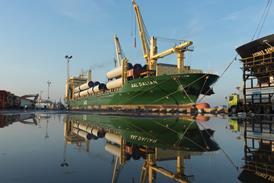HLPFI’s sister publication Air Cargo News spoke with Volga-Dnepr executive president, charter operations, Konstantin Vekshin to discuss how the group will meet the current challenges faced by the air cargo market.

According to Vekshin, the group is well positioned to meet any coronavirus-related cargo capacity shortages. In late January, the company started to anticipate the complications that the virus would cause in terms of how to protect crew and make sure equipment was properly sanitised.
In terms of capacity, the airline group currently operates 16 Boeing 747s, eight AN-124s and three IL-76s across AirBridgeCargo (ABC) and Volga-Dnepr. It previously operated 21 B747s but this has been reduced in line with the market conditions at the end of last year.
On the market this year, Vekshin said that there was not an unexpected spike in westbound demand after factories in China started to re-open following an extended New Year break. However, things have been picking up over recent weeks.
In the opposite direction, however, there had been an early increase in demand to meet requirements for medical products in China.
“We are now seeing more and more cargo coming in both directions,” he said. “And we are anticipating additional demand in relation to outbound cargo. We are also anticipating what is going to happen in Europe over the coming weeks.
“We are ready and will unleash our entire fleet to help our customers and continue to support the bridges that we have been building over the last 30 years.”
He added that while demand has not reached the level of the US West Coast container port strikes of a few years ago, enquiries continue to roll in and forwarders are being proactive.
“Customers are contacting us and we are explaining what sort of availability we have, our reaction times, the specifics of the type of cargo we are going to move, whether that is related to coronavirus directly – like bare essentials or even fully assembled mobile hospitals – or spare parts, assembly parts or components.”
While the group is ramping up the availability of aircraft for charter and reducing scheduled operations, Vekshin said this reflects customer requirements. He explained that over the past year, the market has become more ad hoc in nature and demand harder to predict.
“The demands are very specific right now, reaction times need to be different, flexibility should be different. The decision to switch gears in the direction of dedicated charters, ad hoc flights, has been dictated by the market. Given our expertise, we have been doing well managing all those short-term, short-notice requirements.”
He added that ABC is still offering scheduled services and when the market needs a more predictable capacity provision, it will ramp this operation back up when the market is ready.
On recent reports that the group has been re-negotiating with suppliers, he said this is perfectly normal. “It makes sense to touch base [with suppliers] every now and then to see where you are and what you can expect from each other under the circumstances.
“We have all become part – almost overnight – of this force majeure driven world, it does make sense to stay on the same page and it is always advisable to see what our options may be.”
















